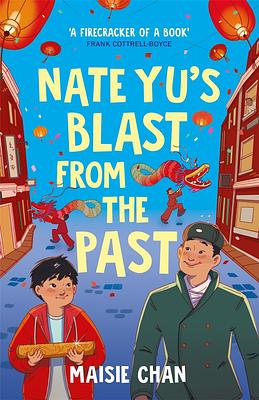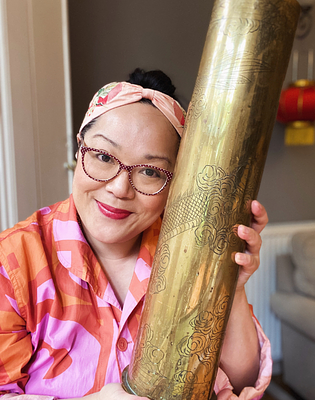Looking for more in Competitions and giveaways?
Bookzilla Book of the Month: Nate Yu's Blast From the Past

We have five signed copies of Nate Yu's Blast From the Past by Maisie Chan published by Bonnier Books, to be won! All you need to do is answer the question at the bottom of the page. Entries close at 11.59pm on Monday 30 June.
All entrants must reside in the UK and full terms and conditions apply. You can check out our competitions page for other giveaways.
To find more great reads for children and young adults, download the Bookzilla book finder app.
About Nate Yu's Blast From the Past
When Nate and his mums move across the country to start a new life in a big city, Nate is not so sure that they’re making the right decision. All he wants to do is keep his head down and study his beloved ant colony, but now he is faced with challenges like fitting in at a huge new school, making new friends, and two parents trying to get him to embrace his Chinese heritage – even though he doesn’t know anything about Chinese customs or culture.
But when Nate comes across an old World War One shell casing engraved with a Chinese dragon as part of a school history project, he can’t help but feel a connection with it. As he touches the casing, Nate is greeted with a surprise visitor. . . of the supernatural variety! Nate and his newfound friends are the only ones who can help Jirou to find peace in the afterlife – but can they find the answers they need before time runs out?
Nate Yu’s Blast from the Past is a phenomenal story for readers aged 8 to 12, skilfully exploring themes of identity, heritage, and belonging. With sensitivity, Maisie Chan addresses the challenges faced by children who are adopted into families of a different race, and how they may struggle to connect with their birth culture. This book is a delightful blend of charm, humour, and depth. As uplifting as it is poignant, it invites young readers to reflect on their own identities and the journeys that shape who we are. The book introduces readers to an often-untold aspect of First World War history: the Chinese Labour Corps (CLC). Readers are gently confronted with the question of whose experiences are included – and whose are not – in the history we are taught.
Maisie Chan also celebrates the power of friendship and family with warmth and authenticity. An absolutely unmissable read full of curiosity, compassion and heart.
Q&A with Maisie Chan
I loved learning all about ants from Nate! What was your favourite thing that you discovered about them in your research?
Learning more about ants for this book was so much fun! My favourite ant fact is ants can become like zombies if exposed to certain types of fungus! I particularly liked the facts that were about death! The idea for having Nate loving ants came from a real interaction that I had with my youngest child. They told me an ant fact on the way to school – it was quite out of the blue as we weren’t talking about ants! My kid said, ‘Did you know that if you squash an ant, it releases pheromones and other ants come to find the body?’ I didn’t know that, but I had a lightbulb moment and said: ‘Can I put that in my book?’ and they said ‘yes!’ so that’s how ants came to be in my book!
What inspired you to write about this period of history and the Chinese Labour Corp (CLC)?

When I was at school, I didn’t feel that connected to history lessons. When I found out about the CLC I was well into adulthood, and I wish I’d known about the men from China who helped the British and the French in the First World War. I wanted to write about Nate feeling connected to history for the first time. There have been books that focus on Black and brown soldiers in the Second World War, but I hadn’t seen any mention the Chinese Labour Corps, so I wanted to teach readers that there are other versions of history out there.
In one of the videos I watched about the CLC, I saw an object at a museum – a golden shell casing with a Chinese dragon engraved around it. It piqued my interest as it showed that these men weren’t just peasants and farmers, some of them were artists. I wondered if they experienced racism, and how they felt about being away from home for the first time to help in a war they didn’t really have any clue about. It’s just a small glimpse into what the CLC went through. I’ve bought myself an engraved shell casing that has a dragon on it! It’s massive!
If you were visited by Jirou or another ghost from his time, what is the first thing you’d show them?
If I had a ghost from the 1920s come and visit me, I would want to show them the INTERNET! I think the internet is a brilliant thing for the most part. Information at the tip of your fingers. You can find out about anything, order food, speak to people in other countries through a screen. I think a ghost would be amazed by what we can do now. But they might also feel sad about other things, like wars still happening, and that humans have advanced in some ways, but not in others. I’d maybe use my phone to order some delicious food and watch some Netflix.
Do you have any advice for young writers on using writing to explore and connect with their own identity?
Often, we’re made up of multiple identities and there might be part of you that you want to connect more with. In this book, I particularly wanted to explore how I felt as an adopted child who didn’t have parents who looked the same as me. I didn’t feel Chinese when I was a child and that ‘lack’ is what I was exploring. I’ve become more comfortable in my identities as an adult. I’ve tried to learn more about Chinese culture and customs by researching and writing stories.
I think stories and literature are wonderful ways to explore aspects of ourselves. Through writing, I certainly try to connect with my Chinese identity, especially as a British Chinese person, who isn’t the same as a person who’s grown up in mainland China, or Hong Kong.
You can also become different characters when writing, and I always come back to our shared humanity. I try to find things to share about being Chinese and then I try to find ways that my characters are universally human, too. I think it’s always that balance for me. How can I teach you something new but also add aspects that are familiar?
I often do have a theme I want to explore when writing novels, and in Nate Yu’s Blast from the Past it was about not feeling Chinese enough. What themes do you want to explore in your stories? How can your main character overcome setbacks?
I came away from reading the book determined to learn more about history’s untold stories. Is this something that you set out to inspire in readers when you were writing it?
Definitely! I wanted to introduce a version of history that isn’t often told, but in a fun way. If I think that something is missing from the children’s book market, then I will try to write those stories myself. I think there should be more books about British Chinese people who have made a difference in the UK – such as Frank Soo, the first British Chinese footballer to play for England. I’ve enjoyed writing about the CLC, and I would love to write more historical fiction.